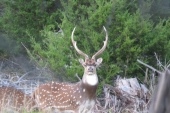I wanted to thank everyone for the warm welcome here. Honestly I tried to start a community and keep it going on my own site for so long I ignored other great communities like this one.
By far the most questions I've gotten here this week related to the subject I typed here. I am lacking something and it worries me enough that I might not try hunting. I wanted to help anyone who might be in that situation. Honestly a good portion of my book is dedicated to helping new hunters with a small portion of the hunting section dedicated to advanced techniques. But I wanted to share some of the more succinct tips here.
No Land
Your tax dollars and hunting/fishing license dollars pay for programs (I think in all states) that help purchase and maintain public hunting land. I don't recommend going to these on opening day of deer season but archery season, squirrel season, obscure bird seasons are all great times to check these out and help fill your freezer (FREE).
When I was growing up we had a hunting "lease". The reason "lease" is in quotes is that we never actually paid. But once a week for 2 months we "put up hay". If you've never put up hay IT SUCKS! But its cheaper than paying for a deer lease (FREE BUT HARD).
If you have money you can always purchase a lease (EXPENSIVE).
No Mentor
I suggested to a previous poster with land that they leverage a hunting "lease" to get mentorship ("leases" work both ways - LOL).
Use the internet. Meetup/craigslist and other places might be a good place to find a hunting partner or mentor.
No Weapon
Borrow one from a friend or family member.
Make your own (for about $100 you can build a longbow with instructions on the web).
Buy one. Yes it costs money but for about $150 you can buy a 12 gauge single shot from Walmart. You will need to have a smith mount some sights (maybe another $25) and slugs (another $10). You could have a hunting weapon for less than $200. The meat from the first deer will pay for that. Plus you can hunt just about any small game animal with the 12 gauge including turkeys.
No Knowledge
Books aren't free but most wildlife departments put out publications (similar to the extension office gardening ones) that can teach the basics on hunting AND fishing.
No Money
Just like in other Permaculture areas redistribute your surplus. If you have a surplus of time/energy/material give it to someone else in the form of a trade for what you need that you don't have in surplus.











